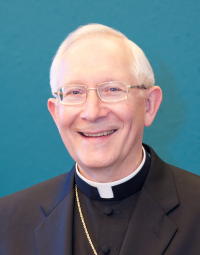
Archbishop Leonard P. Blair
July 25, 2018, marked the 50th anniversary of Blessed (soon to be saint) Pope Paul VI’s encyclical letter Humanae Vitae “on the regulation of birth.” (For an interesting historical newsreel, go to https://bit.ly/2JMBjCd) In the words of Peter Kreeft: “In 2,000 years of the Church’s history, there’s not a single official document which has been hated, despised, rejected and disobeyed by more Catholics than Humanae Vitae. That’s how important it is.”
Until 1930, every Christian denomination was unanimous in condemning contraception. When the Anglicans abandoned this teaching in 1930, and it looked like other denominations might do the same, the Washington Post at that time editorialized that this “would sound the death knell of marriage as a holy institution by establishing degrading practices which would encourage indiscriminate immorality. The suggestion that the use of legalized contraceptives would be ‘careful and restrained’ is preposterous.”
Almost 40 years later, in 1968, when Humanae Vitae reaffirmed Christian teaching about contraception, Blessed Pope Paul VI was prophetic in pointing out some of the consequences of separating intercourse from the procreation of children: namely, a gradual weakening of moral discipline; a trivialization of human sexuality; the demeaning of women; marital infidelity often leading to broken families; and state-sponsored programs of population control based on imposed contraception and sterilization. (cf. Humanae Vitae, 17)
In the years since 1968, we have witnessed the introduction of legalized abortion and euthanasia, an ever-increasing recourse to in vitro fertilization, certain forms of genetic manipulation and embryo experimentation and even an attempted redefinition of marriage and sexuality. These developments are closely related, in law and public policy as well as in contemporary culture, to the idea behind contraception, that is, unlimited dominion over one’s body and life without regard for their God-given meaning and purpose.
We are all familiar with the question that politicians ask at election time: “Are you better off than you were two or four years ago?” In the 1960s, those who were advocating the widespread acceptance of contraceptives argued that marriages and families would be so much healthier if couples were relieved of the stress caused by having too many children or being subjected to the stress of sexual abstinence as the only alternative.
Fifty years later, this rosy promise has been forgotten amid the relentless weakening of marriage and family life. We live in a world of divorce and broken families, cohabitation, “recreational” sex, promiscuity, pornography, the widespread acceptance of immoral sexual acts and unwanted advances and sexual predation, even among some of the clergy. The toll of this “sexual revolution” on psychological, physical, social and even economic health is heavy. And many contraceptive societies face demographic extinction unless they start having enough children to renew their population.
Humanae Vitae recognizes that couples can have valid reasons not to have children at certain times in their married life. People often scoff that the Church condemns so-called “artificial” means but accepts “natural” family planning. After all, the desired effect is the same: no baby. But from a moral point of view, there is a vast difference between the intentional and willful suppression of fertility on the one hand, and the acceptance of a God-given infertile time on the other. For a thoughtful video on this subject, go to www.sexualrevolutionmovie.com.
Today, more than ever, married couples need what Pope Francis calls the loving and supportive “accompaniment” of the Church, of their families and a culture that will support marriage, family, and life at every stage.
Looking at the dark horizon a half-century ago, Blessed Pope Paul VI reaffirmed, as the Church always does, the unconditional love of God made flesh in Christ and mirrored in a striking way in marriage; the universal call to holiness and a life of virtue, including chastity; the abundant graces conferred in the sacrament of marriage for any couple sincerely responding to God’s plan for their lives and seeking to live out what the Church asks of them in Christian marriage and family; the self-sacrificing love of Christ in the Holy Eucharist to raise up and renew the human love that brings spouses together in the first place; and the sacrament of penance, where the Church’s healing and mercy given through Christ in the Holy Spirit can pick them up when they fall, and place them back on the journey of life together “unto a ripe old age” til death do they part.
This kind of “accompaniment” from the heart of the Church is something that every parish needs to foster, and hopefully our archdiocesan synod will help to point a way forward for us all.
As a group of theologians recently observed: “The Church’s teaching on marriage, divorce, human sexuality and chastity can be hard to receive. Christ himself saw this when he proclaimed it. However, this truth brings with it an authentic message of freedom and hope: there is a way out of vice and sin. There is a way forward that leads to happiness and love. Recalling these truths, the Church has reason to accept the task of evangelization in our own age with joy and hope.”
Blessed Pope Paul VI, pray for us!
